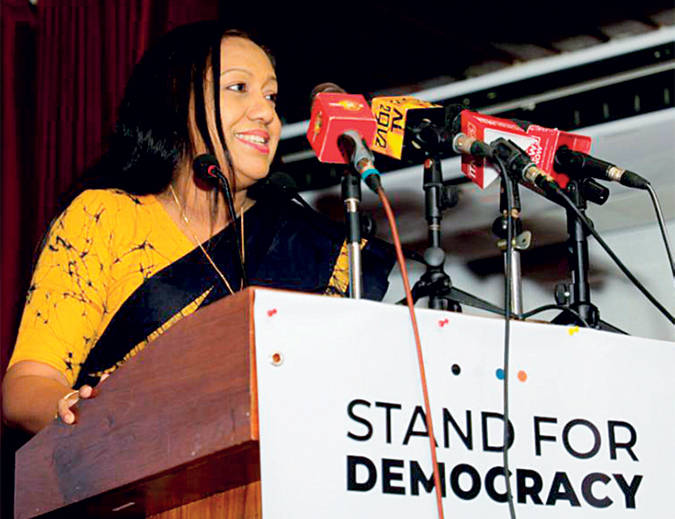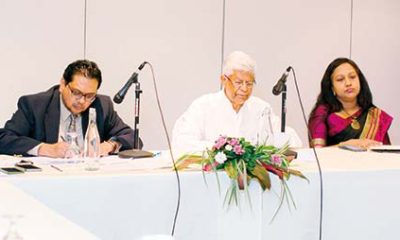News
Civil society coalition urges protection of democratic values amid concerns of judicial independence undermining

A recent series of statements made by high-ranking officials, including the President and the Speaker, as well as some parliamentarians, aiming to erode the autonomy of the judiciary, has raised significant alarm, according to the Civil Society Collective for Democracy (CSCD). The organization emphasizes that although the 21st Amendment to the Constitution has reinstated independent commissions, recent incidents of intimidation targeted at members of the Election Commission and the Public Utilities Commission paint a picture of an increasingly restrictive environment for these bodies.
Addressing these concerns, the CSCD, known by its rallying cry ‘Stand for Democracy,’ convened a meeting consisting of concerned citizens and various groups, such as civil society organizations, professionals, academics, trade unions, youth leaders, activists, media representatives, religious figures, and influencers. The gathering, held at the Sri Lanka Foundation Institute (SLFI) in Colombo on Tuesday (29), resulted in a statement that underscored the urgent need for political leaders to take action against state repression and safeguard the democratic rights of the populace. Such steps are deemed essential for genuine and balanced economic recovery.
The CSCD’s statement further outlines deep apprehension regarding the swift erosion of democratic space within the nation. The removal of Constitutionally guaranteed rights and freedoms, including freedom of expression, right to information, dissent, protest, association, and franchise, has left citizens disempowered. The organization highlights how voices are being stifled, leading to self-censorship among individuals due to the increased targeting and harassment of those questioning authorities. Additionally, the abuse of international commitments, such as the International Covenant on Civil and Political Rights (ICCPR) and the contentious Prevention of Terrorism Act (PTA), to silence opposition figures, civil society activists, and journalists, has been noted.
The CSCD points to recent legislative attempts to introduce oppressive versions of laws like the Anti-Terrorism Act, Broadcasting Commission Act, and the NGO Act as indications of the government’s efforts to tighten its grip on democratic space.
Emphasizing the need to address the root causes of Sri Lanka’s economic crisis, the CSCD stresses the importance of tackling issues like poor governance, inclusivity, and corruption. Without addressing these fundamental concerns, the country’s investment climate may remain unattractive to potential investors, thereby hindering economic recovery.
Transparency and accountability within governance are highlighted as crucial measures to prevent corruption and ensure effective administration. The CSCD asserts that a true democratic system empowers citizens to elect and remove representatives regularly, participate in governmental decisions, express dissent, form groups, and influence authorities when needed.
The CSCD calls upon the political establishment to promptly uphold democratic principles by:
* Conducting timely and inclusive free and fair elections, beginning with Local Government and Provincial Council Elections.
* Safeguarding citizens’ fundamental rights, including freedom of expression, association, and information.
* Creating a supportive environment for civil society activism and protecting civic space.
* Ensuring citizen engagement in steering economic recovery.
* Governing with transparency, accountability, and public scrutiny.
* Strengthening the capacity of independent commissions.
* Implementing essential anti-corruption reforms in earnest.
* Prosecuting past and present corruption cases to end impunity.
News
US sports envoys to Lanka to champion youth development

The U.S. Embassy in Colombo welcomed the U.S. Sports Envoys to Sri Lanka, former National Basketball Association (NBA) and Women’s National Basketball Association (WNBA) players Stephen Howard and Astou Ndiaye, from June 8 through 14.
The Public Diplomacy section of the U.S. Embassy said that it would launch a weeklong basketball program intended to harness the unifying power of sports, made possible through collaboration with Foundation of Goodness and IImpact Hoop Lab.
While in Sri Lanka, Howard and Ndiaye, both retired professional basketball players, will conduct a weeklong program, Hoops for Hope: Bridging Borders through Basketball. The Sports Envoys will lead basketball clinics and exhibition matches and engage in leadership sessions in Colombo and Southern Province for youth aged 14-18 from Northern, Uva, Eastern and Western Provinces, offering skills and leadership training both on and off the court. The U.S. Envoys will also share their expertise with the Sri Lanka Basketball Federation, national coaches, and players, furthering the development of basketball in the country. Beyond the clinics, they will collaborate with Sri Lankan schoolchildren to take part in a community service project in the Colombo area.
“We are so proud to welcome Stephen and Astou as our Sports Envoys to Sri Lanka, to build on the strong people-to-people connections between the United States and Sri Lanka,” said U.S. Ambassador Julie Chung. “The lessons that will be shared by our Sports Envoys – communication, teamwork, resilience, inclusion, and conflict resolution – are essential for leadership development, community building, equality, and peace. The U.S. Sports Envoy program is a testament to our belief that sports can be a powerful tool in promoting peace and unity.”
News
Rahuman questions sudden cancellation of leave of CEB employees

SJB Colombo District MP Mujibur Rahuman in parliament demanded to know from the government the reasons for CEB suspending the leave of all its employees until further notice from Thursday.
MP Rahuman said that the CEB has got an acting General Manager anew and the latter yesterday morning issued a circular suspending leave of all CEB employees with immediate effect until further notice.
“We demand that Minister Kanchana Wijesekera should explain this to the House. This circular was issued while this debate on the new Electricity Amendment Bill was pending. There are many who oppose this Bill. The Minister must tell parliament the reason for the urge to cancel the leave of CEB employees,” the MP said.However, Speaker Mahinda Yapa Abeywardena prevented Minister Wijesekera responding to the query and said that the matter raised by MP Rahuman was not relevant.
News
CIPM successfully concludes 8th Annual Symposium

The Chartered Institute of Personnel Management (CIPM) successfully concluded the 8th Annual CIPM Symposium, which took place on 31st May 2024. Themed “Nurturing the Human Element—Redefining HRM in a Rapidly Changing World,” the symposium underscored the pivotal role of human resource management (HRM) in today’s dynamic global landscape. Since its inception in 1959, CIPM has been dedicated to advancing the HR profession through education, professional development, and advocacy, solidifying its position as Sri Lanka’s leading professional body for HRM.
Ken Vijayakumar, the President of the CIPM, graced the occasion as the chief guest. The symposium commenced with the welcome address by the Chairperson, Prof. Arosha Adikaram, followed by the Web Launch of the Symposium Proceedings and Abstract Book by the CIPM President. The event featured distinguished addresses, including a speech by Chief Guest Ken Vijayakumar, President of CIPM, and an address by Guest of Honor Shakthi Ranatunga, Chief Operating Officer of MAS Holdings Pvt. Ltd., Sri Lanka.
The symposium also featured an inspiring keynote address by Prof. Mario Fernando, Professor of Management and Director of the Centre for Cross Cultural Management (CCCM) at the University of Wollongong, Australia.
Vote of Thanks of the inauguration session was delivered by Dr. Dillanjani Weeratunga, Symposium Co-chair.
The symposium served as a comprehensive platform for researchers to present their findings across a wide range of critical topics in HRM. These included Cultural Diversity and Inclusion, Talent Development and Retention, Ethical Leadership and Corporate Social Responsibility, Adapting to Technological Advancements, Mental Health and Well-being at Work, Global Workforce Challenges, Employee Empowerment, and Reskilling and Upskilling.
The plenary session was led by Prof. Wasantha Rajapakse. Certificates were awarded to the best paper presenters during the valedictory session, followed by a vote of thanks delivered by Kamani Perera, Manager of Research and Development.
The annual symposium of CIPM was a truly inclusive event, attracting a diverse audience that spanned undergraduates, graduates, working professionals, research scholars and lecturers. This widespread interest highlights the symposium’s significance in the field of HRM, offering a unique opportunity for everyone to network and learn from scholarly brains.The CIPM International Research Symposium was sponsored by Hambantota International Port, Sri Lanka Institute of Information Technology (SLIIT), E B Creasy & Co. PLC, and Print Xcel Company.




















